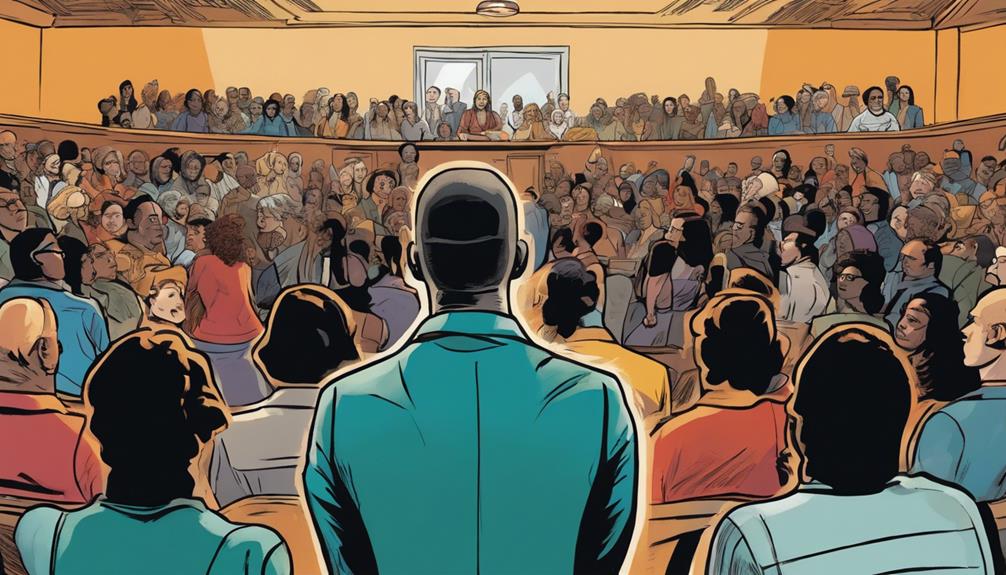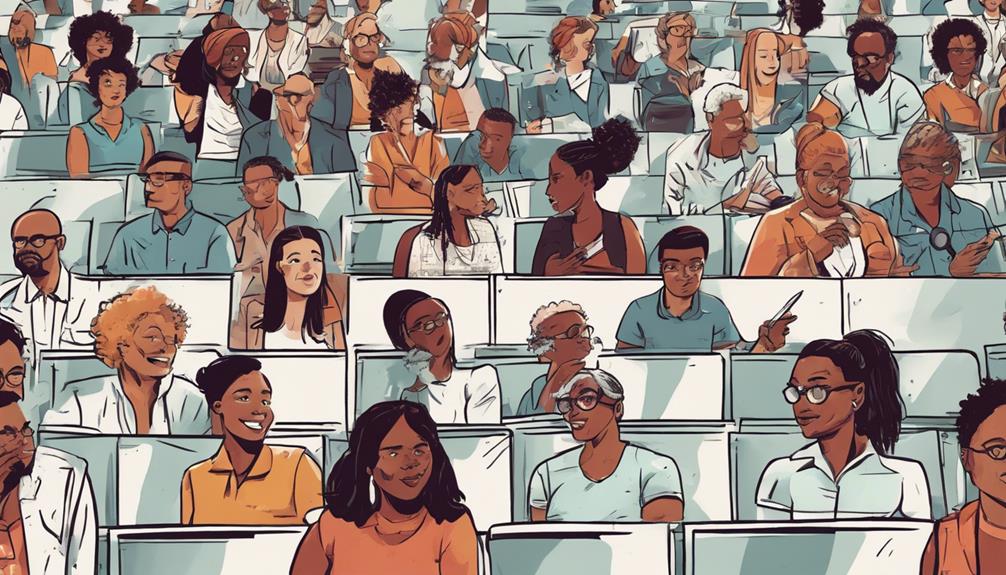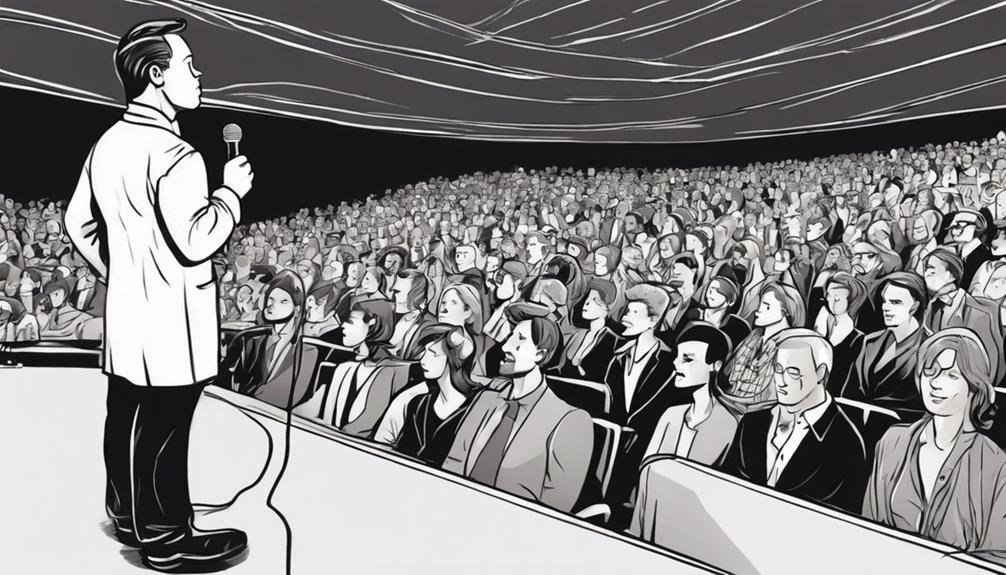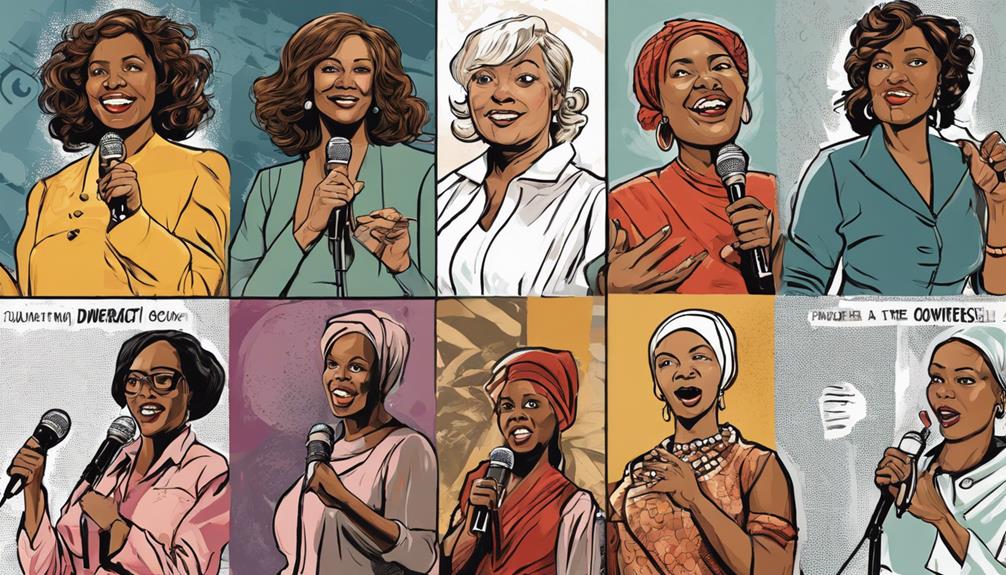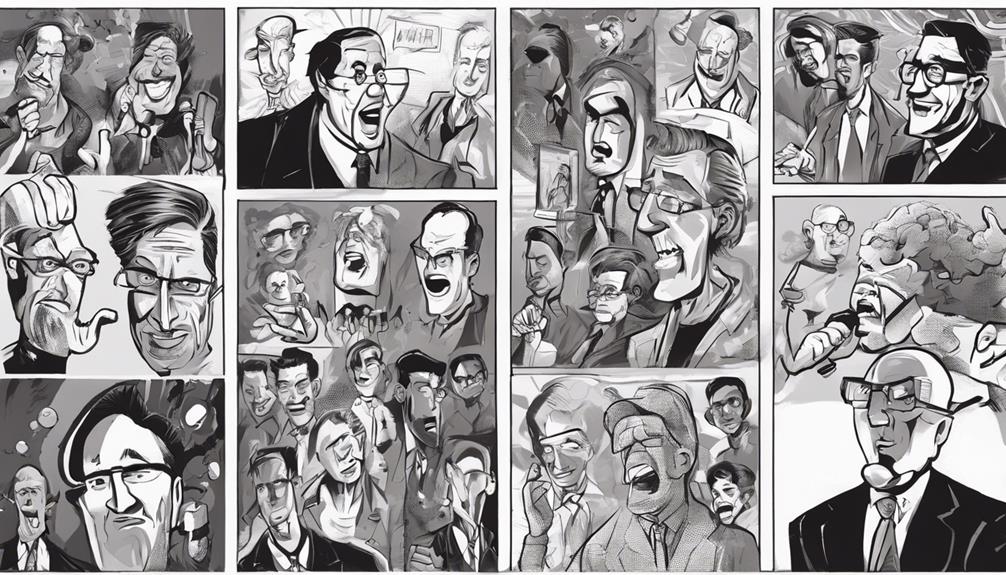Discover the 7 speeches that transformed history. From Queen Elizabeth I's powerful Tilbury Speech to Mandela's Rivonia Trial address, these words had a profound impact shaping nations. Hear Patrick Henry's call for 'Liberty or Death' and Gandhi's plea to 'Quit India.' Roosevelt's Human Rights Address and Reagan's challenge at the Brandenburg Gate still echo today. King Jr.'s 'I Have a Dream' speech resonates in the fight for equality. These leaders' words shook the world, leaving an indelible mark on history.
Key Takeaways
- Queen Elizabeth I's Tilbury Speech inspired unity during the Spanish Armada threat in 1588.
- Patrick Henry's 'Liberty or Death' speech ignited the American Revolution in 1775.
- Mahatma Gandhi's 'Quit India' speeches spurred India's fight for independence in 1942.
- Eleanor Roosevelt's Human Rights Address shaped global human rights agreements in 1948.
- Martin Luther King Jr.'s 'I Have a Dream' speech fueled the civil rights movement in 1963.
Queen Elizabeth I – Tilbury Speech
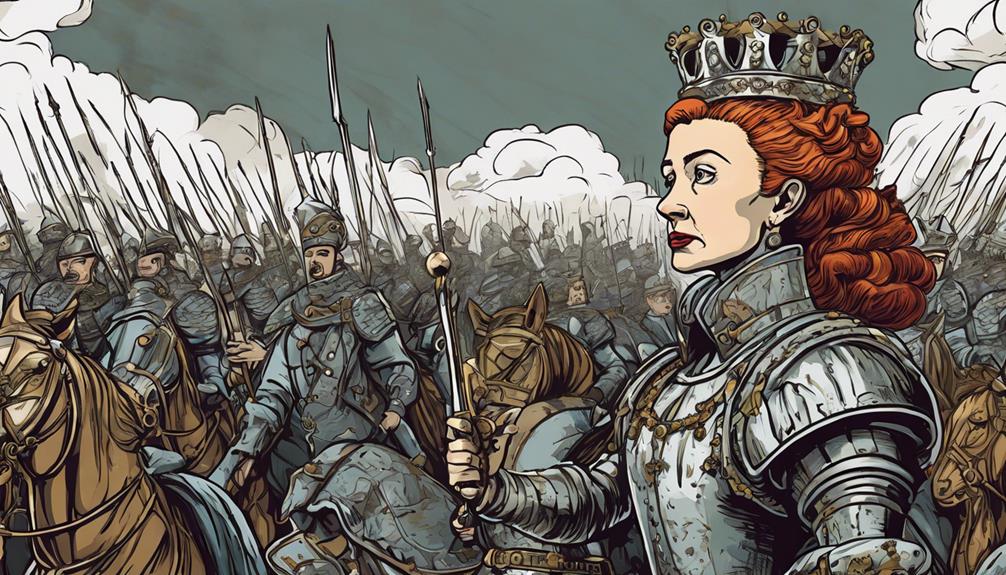
Queen Elizabeth I delivered her iconic Tilbury Speech in 1588 amidst the looming threat of the Spanish Armada invasion. This speech served as a powerful rallying call, boosting the morale of her troops and fostering a sense of unity and determination among them.
Queen Elizabeth I's words at Tilbury resonated with her soldiers as she expressed her willingness to lead and fight alongside them if the need arose. The speech, known for its memorable phrases like 'I may have the body of a weak and feeble woman, but I've the heart and stomach of a king,' encapsulated the queen's strength and resolve.
Patrick Henry – Liberty or Death
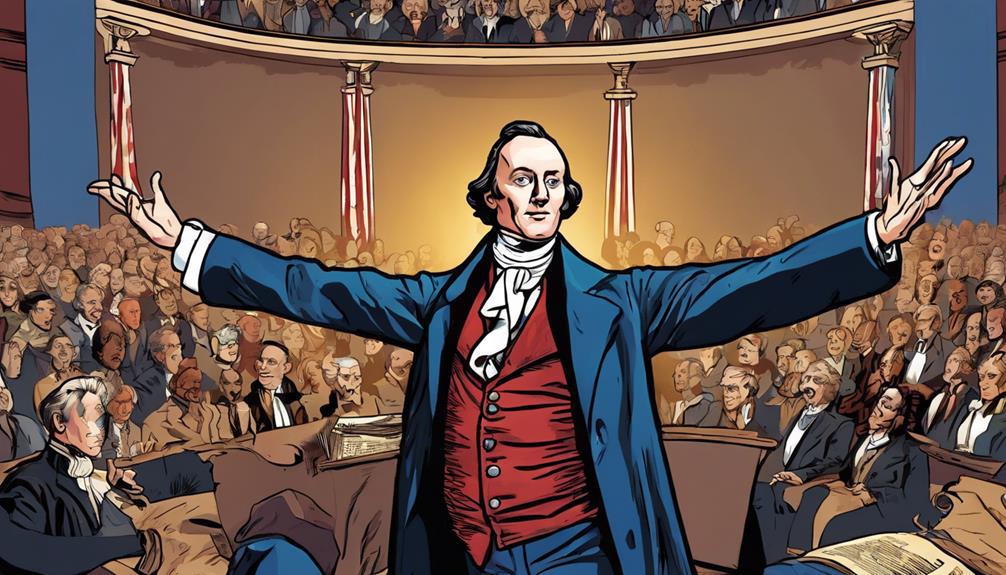
Let's talk about the points surrounding Patrick Henry's 'Liberty or Death' speech.
Henry's call to arms stirred revolutionary inspiration among Virginians, compelling them to fight for independence.
His impactful words played a pivotal role in shaping Virginia's decision to join the Revolutionary War effort.
Henry's Call to Arms
Delivered at the Second Virginia Convention in 1775, Patrick Henry's impassioned speech 'Give Me Liberty or Give Me Death' stirred Virginians to take a stand against British rule. His call to arms was a pivotal moment in the lead-up to the American Revolution, igniting a fire of resistance against British oppression in Virginia. Henry's powerful words resonated deeply with the colonists, urging them to embrace the idea of liberty over the fear of death. The speech marked a turning point in the fight for independence, with Virginia playing a significant role in the revolutionary movement.
| Patrick Henry | Give Me Liberty or Give Me Death | Second Virginia Convention |
|---|---|---|
| American Revolution | British oppression | Virginia |
Henry's speech not only inspired Virginians but also contributed to the broader momentum for independence across the American colonies. His unwavering stance against tyranny became a symbol of courage and determination in the face of adversity.
Revolutionary Inspiration
Henry's impassioned call to arms in his 'Give me Liberty, or give me Death!' speech galvanized Virginians to join the fight for independence against British tyranny. His powerful words, delivered in 1775 during the Virginia House of Burgesses, became a rallying cry for the Revolutionary War.
The speech not only inspired Virginians but also swayed the House of Burgesses to commit troops and resources to the American Revolution. Patrick Henry's resolute stance against British oppression stirred a spirit of revolution and freedom throughout the colonies. His unwavering belief in liberty or death resonated deeply with those seeking independence from British rule.
The impact of Henry's speech was profound, igniting a fire of determination and courage in the hearts of many Americans. It played a pivotal role in shaping the course of the Revolutionary War and set the stage for the fight for freedom that would define the nation's history.
Impact on Independence
The impact of Patrick Henry's 'Give me Liberty or Give me Death' speech on American independence was profound and enduring. Delivered in 1775 in Virginia, Henry's impassioned words stirred the hearts of Virginians and played an essential role in pushing the colony towards joining the Revolutionary War against British rule.
The urgency and fervor with which Henry spoke about the necessity of fighting for freedom resonated deeply with the American colonists, fueling the momentum for independence. Henry's speech symbolized the spirit of defiance and determination in the face of oppression, marking a turning point in American history.
It galvanized individuals to rise against British tyranny and fight for their rights and liberties. The legacy of Patrick Henry's speech endures as a pivotal moment in the fight for American independence, encapsulating the revolutionary inspiration that propelled the colonies towards freedom and self-governance.
Mahatma Gandhi – Quit India
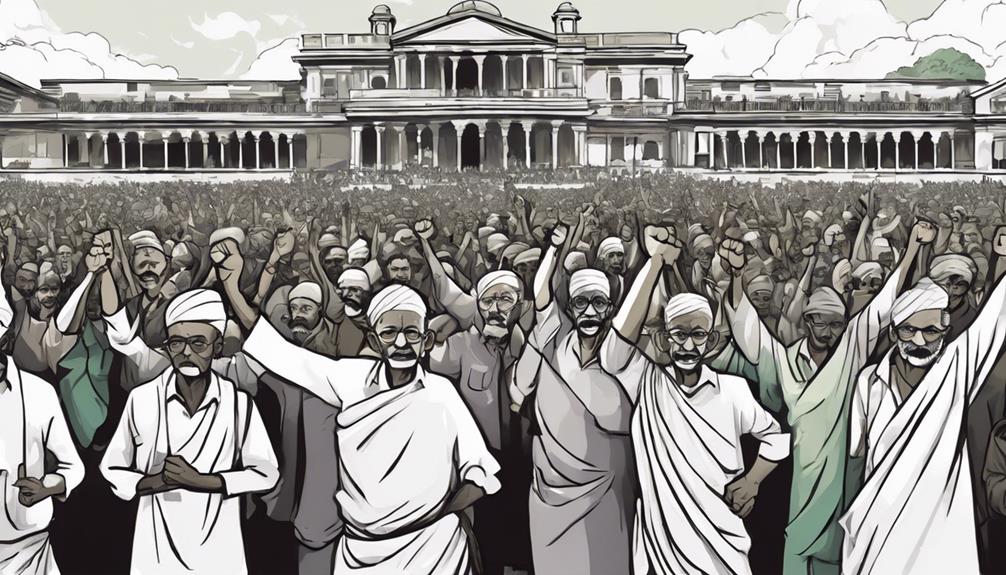
Gandhi's powerful speeches in 1942, urging the British to Depart India, resonated deeply with the Indian population, igniting a passionate desire for independence through nonviolent means. His call for nonviolent resistance against British rule stirred a sense of unity among Indians, leading to the All India Congress Committee passing the Depart India Resolution.
This pivotal moment in India's history marked a turning point in the fight for independence. Gandhi's words during the Depart India movement inspired a nation to stand together and work for freedom. His role as a nonviolent revolutionary and spiritual leader was essential in the success of the movement.
Ultimately, India gained independence in 1947, with Gandhi's influential Depart India movement playing a significant role in achieving this long-awaited freedom. His speeches not only shook the British Empire but also mobilized a nation towards a common goal of self-governance and liberation from colonial oppression.
Eleanor Roosevelt – Human Rights Address
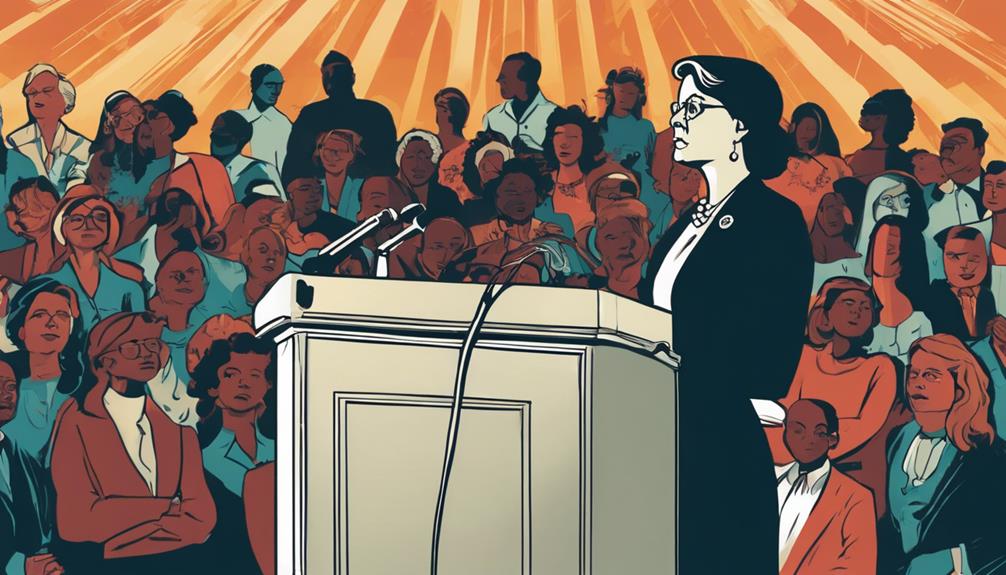
In 1948, Eleanor Roosevelt, as the U.S. representative at the United Nations, delivered a groundbreaking Human Rights Address that laid the foundation for the Universal Declaration of Human Rights. This pivotal speech marked a turning point in the fight for global human rights.
The impact of Eleanor Roosevelt's address at the United Nations General Assembly resonates to this day, influencing national constitutions and human rights agreements worldwide.
- The passion in Eleanor Roosevelt's voice echoed the urgency of protecting human dignity.
- Her words stirred hearts and minds, calling for equality and justice for all.
The Universal Declaration of Human Rights stands as a beacon of hope for the oppressed and marginalized.
- Eleanor Roosevelt's address sparked a movement towards a more just and compassionate world.
This declaration serves as a reminder of our shared responsibility to uphold the rights and freedoms of every individual.
Martin Luther King Jr. – I Have a Dream
Eleanor Roosevelt's groundbreaking Human Rights Address set the stage for another iconic speech that would resonate across generations – Martin Luther King Jr.'s 'I Have a Dream'. Delivered during the 1963 March on Washington for Jobs and Freedom, King's speech passionately called for an end to racism and segregation, advocating for equality and unity among all races. This pivotal moment in the civil rights movement reverberated globally, inspiring hope for a future free from discrimination. King's powerful imagery and message of unity struck a chord with millions, propelling legislative changes like the Civil Rights Act of 1964 and the Voting Rights Act of 1965.
| Martin Luther King Jr. | I Have a Dream | Civil Rights Movement |
|---|---|---|
| Equality | Racism | Segregation |
Nelson Mandela – Rivonia Trial Speech
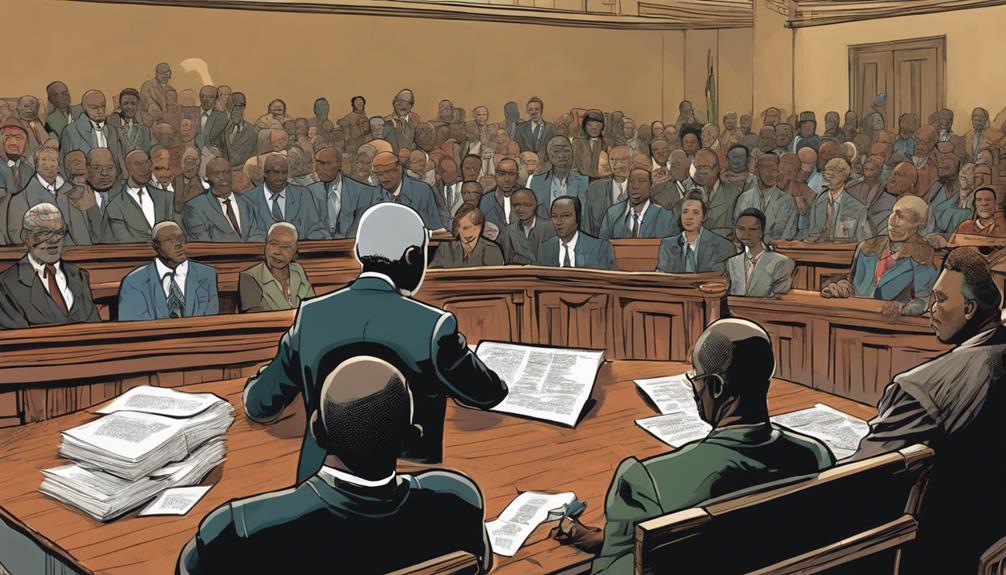
You're about to discover the profound impact of Nelson Mandela's Rivonia Trial speech. His words not only showcased his unwavering dedication to fighting apartheid but also sparked a powerful anti-apartheid movement in South Africa.
Mandela's enduring legacy as a symbol of hope and perseverance continues to inspire generations worldwide.
Mandela's Inspiring Anti-Apartheid Activism
With his impassioned speech at the Rivonia Trial in 1964, Nelson Mandela galvanized the global fight against apartheid in South Africa. Mandela's unwavering commitment to challenging apartheid through non-violent resistance left a profound impact on anti-apartheid movements worldwide. As you explore the depths of Mandela's speech and activism during the trial, you can't help but feel:
- Anger at the injustices perpetuated by the apartheid regime.
- Admiration for Mandela's courage and perseverance in the face of adversity.
- Empathy for the countless individuals who suffered under apartheid's oppressive rule.
- Hope for a future where equality and justice prevail over discrimination.
- Inspiration to stand up against any form of systemic oppression and fight for a better world.
Mandela's Rivonia Trial speech not only marked a pivotal moment in history but also stirred emotions and ignited a flame of resistance that ultimately brought an end to apartheid in South Africa.
Impact of Rivonia Trial
Mandela's Rivonia Trial speech not only galvanized the global fight against apartheid but also left a lasting impact on the anti-apartheid movement. In 1964, Nelson Mandela's impassioned plea for equality and freedom in South Africa reverberated worldwide.
During the trial, Mandela's unwavering commitment to non-violent resistance against apartheid was resolute. His words at Rivonia became a defining moment, symbolizing a shift in his activism against racial segregation. The speech inspired countless activists and played a pivotal role in dismantling the oppressive apartheid regime in South Africa.
Mandela's message of unity and justice echoed through generations, fueling the struggle for a more equitable society. The Rivonia Trial stands as a tribute to Mandela's enduring legacy and his unwavering dedication to the principles of equality and freedom.
Mandela's Enduring Legacy
Nelson Mandela's impact on history through his Rivonia Trial speech resonates as a beacon of hope and inspiration for social justice movements worldwide. His unwavering commitment to freedom and equality reverberates through time, leaving an indelible mark on the fight against injustice.
Here are five emotional aspects of Mandela's enduring legacy:
- Mandela's powerful words stirred hearts and ignited a passion for change.
- His sacrifice and resilience in the face of adversity continue to inspire courage.
- The legacy of his Rivonia Trial speech symbolizes the triumph of the human spirit over oppression.
- Mandela's advocacy for social justice movements serves as a guiding light for those seeking equality.
- His unwavering belief in a better future for all echoes in the ongoing pursuit of justice around the globe.
Nelson Mandela's legacy from the Rivonia Trial speech stands as a demonstration of the enduring power of one individual's voice in the pursuit of a more just and equal world.
Ronald Reagan – Brandenburg Gate Address
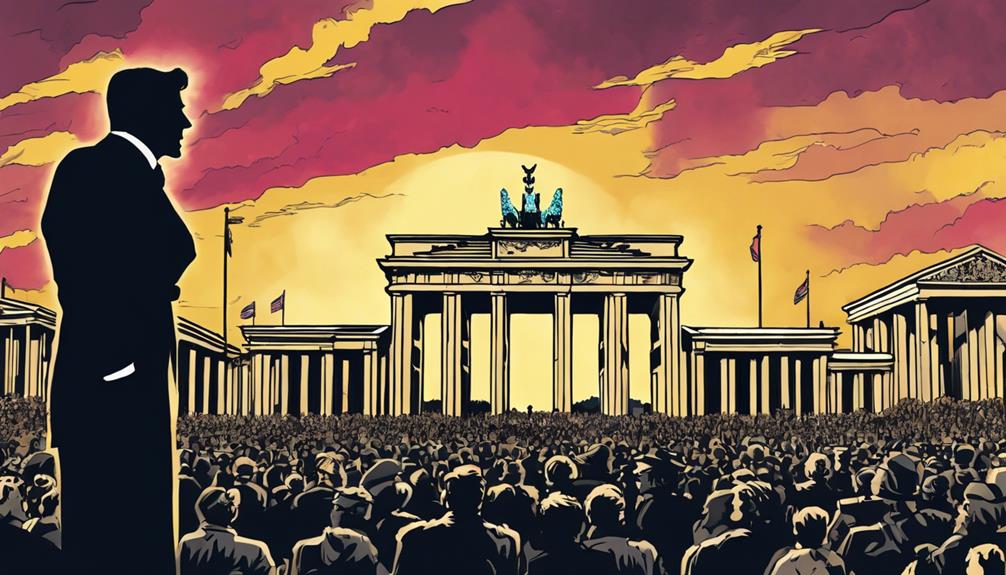
During his iconic speech at the Brandenburg Gate in 1987, Ronald Reagan boldly challenged the Soviet Union and called for the tearing down of the Berlin Wall. The address symbolized the fight for freedom and became a defining moment of the Cold War era. Reagan's powerful words, 'Mr. Gorbachev, tear down this wall!' reverberated globally, emphasizing the need for unity and the dismantling of barriers.
To explore more deeply the impact of Reagan's Brandenburg Gate Address, let's take a closer look at the significance of this historic event:
| Keywords | Details | Importance |
|---|---|---|
| Ronald Reagan | 40th President of the United States who delivered the speech. | Key figure in Cold War politics. |
| Brandenburg Gate | Location in West Berlin where Reagan delivered his memorable speech. | Symbol of division during the Cold War. |
| Cold War | Period of geopolitical tension between the Soviet Union and the West. | Context of Reagan's call for unity and freedom. |
| Berlin Wall | Concrete barrier that separated East and West Berlin. | Reagan's plea for its demolition marked a turning point. |
Frequently Asked Questions
What Famous Speech Changed the World?
One famous speech that changed the world is Martin Luther King Jr.'s "I Have a Dream" speech. It inspired civil rights movements, promoted equality, and resonated globally. King's powerful words continue to influence generations towards justice and unity.
What Is the Most Influential Speech in the World?
You might think the most influential speech is a tough call, but let's be real – MLK's 'I Have a Dream' speech takes the cake. It moved mountains, stirred souls, and ignited change.
Who Has Impacted the World With Their Words?
You impacted the world with your words. Your message inspired change, unity, and progress. Your voice resonated, sparking movements and shaping history. Your influence continues to shape minds and hearts globally.
What Are the Four Famous Letters and Speeches by Dr. King?
So, you wanna know about those four famous letters and speeches by Dr. King? Well, there's the 'Letter from Birmingham Jail,' 'I Have a Dream' speech, Nobel Prize acceptance speech, and the 'Mountaintop' speech.
What Impactful Words Did Warren Buffett Use in His Timeless Wisdom Unveiled?
Warren Buffett’s timeless wisdom has left a lasting impact on the business world. His words are simple yet powerful, inspiring many to pursue long-term investments and financial intelligence. Through his practical advice and insightful teachings, warren buffett timeless wisdom continues to guide and influence generations of investors.
Conclusion
So there you have it, those speeches really shook things up, didn't they? Who knew a few words could have such a big impact?
Maybe it's time to start working on your own powerful speech – who knows, you might just change the world too. But hey, no pressure or anything.
Just remember, words have power, so use them wisely.
Good luck, future world changer!

